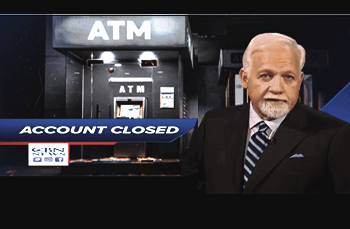09-13-2023 DALE HURD
An increasing number of Christian and conservative organizations say they’re being ‘de-banked.’ Accounts are closed, payment processors are turned off, or some are placed on a donor ‘blacklist.’
Banking and financial services have become weaponized. Christian and conservative groups labeled ‘high risk’ can be denied financial services, and it’s happening under the cover of federal banking laws.
Among the victims? Indigenous Advance Ministries, which helps orphans and widows in Africa. Its account was closed by Bank of America.
Family Council of Arkansas, which promotes traditional family values, was canceled by JPMorgan Chase.
The pro-family Ruth Institute lost its payment processor after being targeted as a hate group by the Southern Poverty Law Center.
*** Bank of America Accused of Discrimination After ‘Politicized Debanking’ of Christian Charity
‘We’re Not Going to Do Business with You Anymore’
“We received an email saying, ‘We’re not going to do business with you anymore,'” said Dr. Jennifer Roback Morse, founder of the Ruth Institute. “My colleague went right then and looked at our bank account and it was gone. The credit card processing was gone.”
And what qualified The Ruth Institute as an alleged “hate group”? Morse says, “The dream of the Ruth Institute is that every child be welcomed into a loving home with their own mother and father married to each other.”
*** ‘A Bank Kicked Me Out… Froze My Debit Cards’: Why Nick Vujicic Is Launching a Bank for Pro-Lifers
Even the National Committee for Religious Freedom, a multi-faith organization headed by former U.S. Senator and Religious Freedom Ambassador Sam Brownback, had its bank account closed by JPMorgan Chase.
Brownback told us, “I went in to make a deposit at a branch here in Kansas about three or four weeks after we’d opened up the account, I think. And the teller there said ‘That account’s been closed.’ And I go, ‘What?’ and they said, ‘That account’s been closed. Your funds will be being sent to you in a couple of weeks.'”
Federal Banking Laws Provide ‘Cover’
Banking expert Nick Anthony at the CATO Institute says federal law gives banks a myriad of excuses to cancel groups whose values present so-called “reputational risks.” He adds the real culprit may also be federal regulators, who can pressure banks to cancel certain groups.
Anthony told us, “Banks are deputized as de facto law enforcement investigators, and they face a very real consequence of missing anything. When banks have concerns about things like money laundering or suspicious source of funds or they don’t like where the funds are going for any reason, they’re prohibited from telling customers what the actual reason is. They’re prohibited from telling people that they filed these reports to the government and now something has gone awry.”
That said, Anthony believes the law is also being used as cover to cancel groups banks don’t like.
Sam Brownback would later learn that JPMorgan Chase canceled his group after designating him as a “politically exposed person” with a “customer risk profile,” a designation Brownback said is only supposed to be applied to foreign nationals, not former U.S. Senators.
Nevertheless, JPMorgan Chase CEO Jamie Dimon said at a shareholder meeting this year, “No apologies are necessary and no corrective action is necessary.”
LGBTQ Pressure on Corporate Boardrooms
It’s no secret that corporate boardrooms are under pressure to push DEI: Diversity, equity, and inclusion, which includes the LGBTQ agenda.
The most powerful investment firm in the world, Blackrock, has stated that LGBT diversity is “in their DNA,” and nearly every major credit card issuer has openly donated money to the LGBTQ cause; a cause most conservative faith groups oppose.
Morse of the Ruth Institute says, “The profit motive is not their only motive anymore. The people who are choosing the regulatory process are people who have a vision for family life in America. And they’re using their power to create a world in their own image.”
Bank of America Responds
Bank of America, which closed Indigenous Advance Ministries’ account, said “religious beliefs are not a factor in any account-closing decision,” but that it was because of a side business of debt collection services run by the ministry.
However, while we found one instance where a liberal group was de-banked, most have been conservative or faith groups.
After his experience, Brownback started a website called ‘Chased Away,’ so others like him could share their story.
“You ought to be able to be a Christian if you want to and use whatever bank you want to and not be excluded based on your values. You shouldn’t have these sorts of experiences happen to you just for peacefully practicing your faith,” Brownback said.
Unfortunately, Anthony expects the de-banking trend to continue until Congress finally changes the banking laws to protect people of faith.
